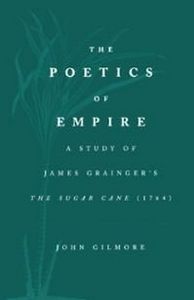First published in 1764, The Sugar-Cane is a major work in the history of Anglophone Caribbean literature. It is the only poem written in the Caribbean before the twentieth-century to achieve a place in the Western "canon." Grainger sought to interpret his personal experience of the Caribbean through his wide and deep reading in literature, from the Greeks to Milton. Grainger wrote a "West India Georgic," challenging assumptions about poetic diction and the proper subject matter of poetry, and boldly asserting the importance of the Caribbean to the eighteenth-century British empire. This is the first reliable text and critical study of the poem, setting it within the context of Grainger's life and work.
ames Grainger was born about 1721 in Berwickshire in southeast Scotland, the son of a tax collector. He studied medicine at the University of Edinburgh, spent three years as an army surgeon in Scotland and Holland, and made a grand tour of Europe before receiving his M.D. degree in 1753.His literary interests led to friendships with the key figures in London’s cultural world at midcentury: Robert Dodsley, Oliver Goldsmith, Samuel Johnson, Thomas Percy, Sir Joshua Reynolds, William Shenstone. In his Life of Johnson (1791), James Boswell recorded Bishop Percy’s opinion of Grainger: “He was not only a man of genius and learning, but had many excellent virtues; being one of the most generous, friendly, and benevolent men I ever knew.”
In hopes of improving his fortune, Grainger set out in 1759 to the West Indies as a paid companion to John Bourryau, a wealthy friend who owned plantations on the island of St. Christopher (St. Kitts). Shortly after arriving, Grainger met and married a local heiress, whose family made him manager of their estates. Grainger continued his medical practice on the side, hoping one day to be able to buy his own sugar plantation. His authorship of The Sugar-Cane represents his education in the cultivation and manufacture of sugar, combined with his growing interest in the history, geography, and natural history of the islands. Interestingly, the poem also suggests Grainger’s continuing interest in medicine.
